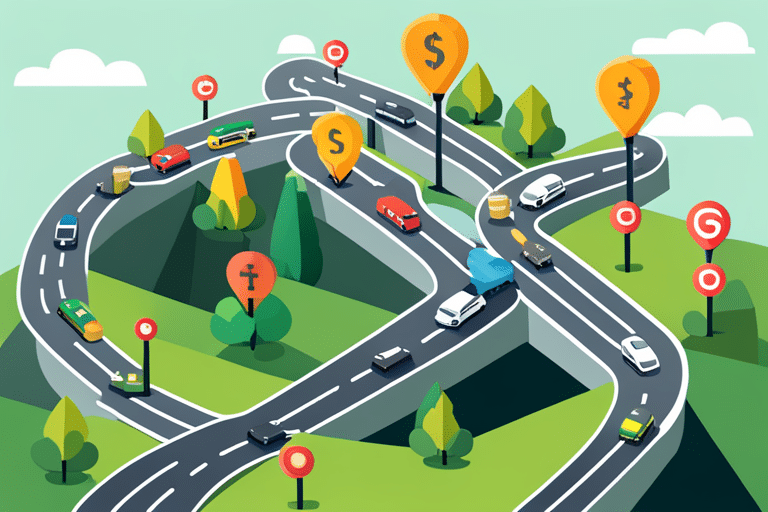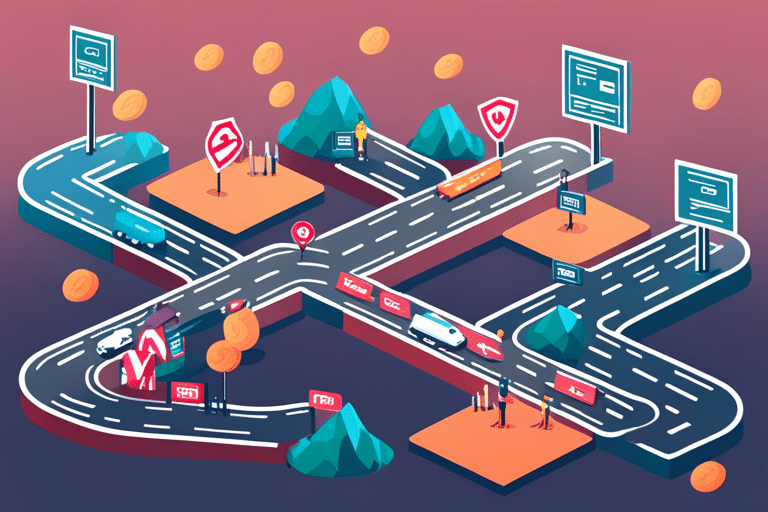Are you tired of being stuck in the never-ending cycle of debt? Ready to break free from those financial pitfalls and reclaim control over your money? Well, my friend, you’ve come to the right place!
In this article, we’re going to show you how to avoid common debt traps and navigate through the treacherous waters of personal finance. So grab a pen, buckle up, and get ready for a journey towards financial freedom that will leave you feeling empowered and in charge.
Let’s dive in!
Key Takeaways
- Debt consolidation can be a helpful strategy for managing debt, but it is important to carefully consider the interest rates and potential impact on credit score.
- It is crucial to prioritize paying off high-interest credit cards first, while making minimum payments on other cards.
- Creating a realistic budget and cutting back on unnecessary expenses can help in managing debt and avoiding financial pitfalls.
- Building healthy financial habits, such as avoiding impulse buying and practicing mindful spending, can contribute to avoiding common debt traps.
Understanding the Impact of Debt

Understanding the impact of debt can help you make smarter financial decisions in the future. It’s like having a secret weapon in your pocket, ready to be unleashed whenever necessary. Debt may seem like a daunting monster lurking in the shadows of your bank account, but fear not! With a little understanding and some clever maneuvering, you can manage debt effectively and come out on top.
So, what exactly is the impact of debt? Well, let me break it down for you. When you take on debt, whether it’s through credit cards or loans, it affects your financial health in more ways than one. Firstly, it has a direct impact on your credit score. Missed payments and high balances can leave a lasting mark on your credit report, making it harder for you to secure future loans or get approved for that dream apartment.
But wait, there’s more! Debt also has an indirect impact on your mental well-being. The constant worry and stress that comes with owing money can take a toll on your overall happiness and peace of mind. So why not tackle this beast head-on?
By understanding how debt impacts your life and taking steps to manage it effectively – such as creating a budget, paying off high-interest debts first – you can regain control over your finances and live a life free from its clutches.
Remember: knowledge is power when it comes to conquering debt. So arm yourself with information and watch as those pesky debt traps become nothing more than mere obstacles along the path to financial freedom!
Identifying Common Debt Traps

You can easily recognize the signs of falling into debt traps by being aware of warning signals. It’s like learning to spot a wild animal in its natural habitat – you just have to pay attention and be observant.
So, let’s go on a little safari through the world of debt, shall we?
First up on our debt trap safari is the notorious Debt Consolidation Monster. This sneaky creature lures you in with promises of lower interest rates and simplified payments. But beware! If you don’t address the underlying issues that got you into debt in the first place, you’ll soon find yourself tangled in an even bigger web.
Next, we encounter the sly Debt Negotiation Ninja. This stealthy warrior offers to negotiate with your creditors to reduce your debts. Sounds great, right? Well, hold your horses! While it may provide temporary relief, it often comes at a price – damaging your credit score and leaving a scar on your financial reputation.
Now that we’ve spotted these common debt traps, it’s time to gear up for our next adventure: creating a realistic budget. After all, prevention is better than cure when it comes to avoiding those pesky pitfalls of overspending and living beyond our means.
Creating a Realistic Budget

Now, let’s dive into the process of crafting a budget that accurately reflects your financial situation and goals. Creating a realistic budget is like sculpting a masterpiece out of clay – it requires precision, creativity, and a touch of finesse. But fear not! With these effective budgeting strategies up your sleeve, you’ll be on your way to financial freedom in no time.
First things first, grab a cup of coffee (or tea if that’s more your vibe) and find a cozy spot where you can really focus. Take a deep breath and let’s get started. Begin by listing all your sources of income – whether it’s from your job, side hustles, or that lemonade stand you run during summer weekends.
Next up, gather all those pesky bills and expenses that seem to magically appear each month. Categorize them into fixed expenses like rent or mortgage payments, utilities, and car payments; variable expenses like groceries and entertainment; and finally, those sneaky little unexpected expenses that always seem to pop up at the most inconvenient times.
Once you have everything listed out neatly (you’ve got this!), it’s time to crunch some numbers. Start allocating amounts for each category based on their priority level. Remember to leave yourself some room for savings – we all deserve an emergency fund superhero cape!
And just like magic (Abracadabra!), you’ve created a realistic budget tailored specifically to your needs and aspirations. Now go forth with confidence as we dive into strategies for managing credit card debt…but don’t forget to give yourself a pat on the back first! You’re already one step closer to mastering this whole financial wizardry thing!
Strategies for Managing Credit Card Debt

Take a deep breath and let’s explore effective strategies to manage your credit card debt. We all know that sinking feeling when we see those bills piling up, but fear not! Here are some tips to help you navigate the treacherous waters of credit card debt:
-
Credit Card Consolidation: Consider consolidating all your credit card balances into one loan with a lower interest rate. This can make it easier to keep track of payments and ultimately save you money in the long run.
-
Debt Repayment Strategies: Get strategic about paying off your debt. Start by tackling high-interest cards first, while still making minimum payments on the rest. Once you pay off one card, move onto the next until you’re swimming in freedom!
-
Budgeting and Discipline: Create a realistic budget and stick to it like glue! Cut back on unnecessary expenses (yes, that means fewer avocado toast brunches) and redirect those savings towards paying down your debt.
Now that you’ve got some tricks up your sleeve for managing credit card debt, let’s dive into another financial pitfall: avoiding impulse buying. Because let’s face it, we’ve all fallen victim to that irresistible sale or shiny new gadget at some point in our lives…
Avoiding Impulse Buying

So, you’ve managed to get your credit card debt under control, but now it’s time to tackle the next challenge: avoiding impulse buying. Don’t worry, we’ve got your back!
In this discussion, we’ll dive into the world of mindful spending habits and budgeting for necessities. Because let’s face it – those cute cat-shaped paper clips may be tempting, but they’re not exactly a necessity (although they are pretty adorable).
Mindful Spending Habits
To avoid falling into common debt traps and financial pitfalls, you should be mindful of your spending habits. Financial mindfulness is like a superpower that helps you stay in control of your money and make smart choices.
So, here are three bulletproof tips to level up your financial game:
-
Track Your Expenses: Keep a record of every penny you spend. It may sound tedious, but it’s the first step towards understanding where your money goes. Plus, it’s a great way to spot any unnecessary spending habits.
-
Set Spending Limits: Give yourself a budget for different categories like groceries, entertainment, or clothes shopping. This will prevent impulsive splurges and ensure that you’re always within your means.
-
Prioritize Saving: Make saving a priority by setting aside an amount from each paycheck. Think of it as paying yourself first! This habit will not only build your emergency fund but also help you reach long-term financial goals.
Budgeting for Necessities
Tracking your expenses is essential for understanding where your money is going and ensuring that you budget effectively for necessities. Let’s face it, budgeting can be as exciting as watching paint dry, but fear not! I’ve got some budgeting techniques and saving strategies that will make it a breeze. Check out this handy table below to get started:
| Category | Monthly Budget | Actual Expenses | Difference |
|---|---|---|---|
| Housing | $800 | $850 | -$50 |
| Transportation | $200 | $180 | +$20 |
| Groceries | $300 | $320 | -$20 |
| Utilities | $150 | $140 |
Navigating Student Loan Repayment

Make sure you understand the terms and conditions of your student loan repayment plan before making any decisions. Student loans can be a daunting part of adulting, but fear not! We’re here to guide you through the maze of repayment strategies and loan forgiveness options. Get ready to tackle your debt like a boss!
Here are three things to keep in mind as you navigate the world of student loan repayment:
-
Know Your Options: There are different types of repayment plans available, such as standard, income-driven, or graduated. Each comes with its own pros and cons, so take the time to explore which one fits your financial situation best.
-
Loan Forgiveness Fairy Tale: Don’t fall for scams promising magical loan forgiveness overnight. While there are legitimate options for loan forgiveness, they usually require specific criteria like working in public service or teaching in low-income areas. Keep an eye out for those unicorns!
-
Pay More Than the Minimum: If possible, try to pay more than the minimum each month. By doing so, you’ll reduce both the total interest paid over time and the length of your loan term. Plus, imagine how satisfying it’ll feel to see that balance shrink faster than expected!
Understanding these key aspects will help you make informed decisions about your student loans and avoid falling into financial pitfalls.
Speaking of pitfalls… let’s now dive into the dangers of payday loans.
The Dangers of Payday Loans

So you think you can handle the thrill of high interest rates?
Well, get ready for a rollercoaster ride through the cycle of debt!
These payday lenders are like predators lurking in the shadows, just waiting to pounce on unsuspecting victims.
Don’t be their next target – arm yourself with knowledge and avoid falling into their trap.
High Interest Rates
Avoiding high interest rates is essential for maintaining healthy financial habits. Let’s face it, nobody likes paying more than they have to, especially when it comes to borrowing money. So, buckle up and get ready to dive into the world of interest rates – a wild ride that can either make or break your bank account.
Here are three things you need to know about high interest rates:
-
Compound Interest: This sneaky little devil can quickly turn a small loan into a mountain of debt. It’s like adding fuel to a fire – the longer you let it burn, the bigger it gets. So be mindful of how compound interest works and its potential impact on your finances.
-
Calculating Interest Payments: Don’t let those numbers scare you! Understanding how interest payments are calculated gives you the power to take control of your finances. Trust me, being able to crunch these numbers will make you feel like a math wizard.
-
The Snowball Effect: High interest rates can create a snowball effect where your debt keeps growing and growing until it feels impossible to escape. But fear not! By avoiding high-interest loans and credit cards, you can prevent this vicious cycle from taking over your life.
Cycle of Debt
Alright, buckle up and get ready for a wild ride! We’re about to dive into the treacherous waters of the ‘Cycle of Debt’. Picture this: you find yourself in a sticky situation, drowning in debt. You take out a loan to pay off some bills, but guess what? The interest rates are sky-high! And before you know it, you’re stuck in a never-ending loop of borrowing just to keep your head above water.
But fear not, my friend! There is hope for breaking free from this vicious cycle. Let me lay it all out for you in this handy-dandy table:
| Step 1 | Step 2 | Step 3 | Step 4 |
|---|---|---|---|
| Assess | Budget | Cut | Save |
| your debts | wisely | expenses | like mad! |
So here’s the deal: assess your debts, create a realistic budget, cut unnecessary expenses like that overpriced latte addiction (ouch!), and save every penny you can muster. Stick to these steps religiously and watch as that pesky cycle starts to crumble.
And speaking of cycles, let’s move on to our next thrilling chapter: ‘Predatory Lending Practices’!
See how I did that? Seamless transition right there. Now let’s uncover those sneaky lenders who are out to trap unsuspecting borrowers. Let’s go!
Predatory Lending Practices
Let’s dive into the shady world of predatory lending practices and expose those lenders who take advantage of unsuspecting borrowers. These unscrupulous characters lurk in the shadows, ready to pounce on anyone in need of a quick financial fix.
But fear not! You are armed with knowledge and can protect yourself from their clutches. Here are some bullet points to get you started:
-
Predatory lending consequences: It’s like being trapped in a spider’s web, with exorbitant interest rates and hidden fees that keep spiraling out of control.
-
Predatory lending alternatives: Think of these as your escape routes, offering lower rates, fair terms, and transparency.
Building an Emergency Fund

To start building an emergency fund, you need to prioritize saving a portion of your income each month. Yes, I know what you’re thinking – ‘But my paycheck is barely enough to cover my avocado toast addiction!’ Trust me, I get it. But think about it this way: having some emergency savings tucked away is like having a secret stash of chocolate hidden in your sock drawer. It’s there for those unexpected moments when life throws lemons at you and all you want is a margarita.
Creating an emergency fund is like building your own personal rainy day fund. Picture yourself as the CEO of Rainy Day Inc., making strategic financial moves that keep you prepared for whatever storm comes your way. So, how do you go about doing this? Start by setting aside a small percentage of your income each month – let’s say 10%. Treat it like a bill that needs to be paid before anything else. And no cheating! That means no dipping into your emergency savings for impulsive online shopping sprees or spontaneous trips to Bali.
Remember, emergencies are inevitable – just like bad hair days or Mondays that feel like they last forever. By stashing away some cash each month, you’ll be ready to tackle any unexpected expense with grace and ease. Plus, knowing that you have a safety net will give you peace of mind and prevent those sleepless nights spent worrying about money.
Exploring Alternative Financing Options

Looking for alternative financing options? Have you considered exploring peer-to-peer lending platforms? They’re like the cool kids of the crowdfunding world, offering a fresh and exciting way to borrow money. So grab your virtual backpack and get ready to dive into this brave new financial frontier.
Here are three reasons why peer-to-peer lending might just be your ticket out of a financial pickle:
-
Community Support: With peer-to-peer lending, you’re not dealing with faceless banks. Instead, you’re connecting with real people who want to help you reach your financial goals. It’s like having a cheerleading squad on speed dial!
-
Flexibility: Peer-to-peer lending offers more flexibility than traditional loans. You can customize repayment terms that suit your needs, making it easier to manage your finances without feeling suffocated by rigid payment schedules.
-
Lower Interest Rates: Who doesn’t love saving money? Peer-to-peer lenders often offer lower interest rates compared to traditional lenders. That means more cash in your pocket and less lining the pockets of big banks.
Recognizing Warning Signs of Financial Trouble

Make sure you keep an eye out for red flags that could indicate financial trouble. It’s like playing a game of financial detective, where you have to spot the warning signs before they turn into full-blown disasters. But don’t worry, with a little bit of knowledge and savvy, you’ll be able to navigate these treacherous waters.
To help you on your quest to financial mastery, here’s a handy table outlining some common warning signs and what they might mean:
| Warning Sign | What it Might Mean | Action to Take |
|---|---|---|
| Mounting Credit Card Debt | Overspending or loss of income | Create a budget and seek debt counseling |
| Frequent Overdraft Charges | Poor money management or low income | Review spending habits and consider increasing income |
| Late Payment Notices | Cash flow problems or forgetfulness | Set up automatic payments or use reminder apps |
So, if you notice any of these warning signs popping up in your life, don’t panic! Instead, take action. Address the root cause of the problem and make necessary adjustments to get back on track.
Protecting Your Credit Score

Hey there, credit score warrior!
Ready to dive into the world of credit scores and learn how to protect your financial reputation like a pro?
In this discussion, we’ll explore the importance of having a good credit score and share some nifty tips on how to avoid any damage that could potentially tarnish it.
Credit Score Importance
Understanding the importance of your credit score is crucial in avoiding common debt traps and financial pitfalls. Your creditworthiness can determine whether you get that dream car or have to settle for a rusty bicycle.
So, let’s dive into the world of credit scores and unlock the secrets to improving them.
- A good credit score opens doors to lower interest rates, saving you loads of moolah.
- It boosts your chances of getting approved for loans faster than Usain Bolt on roller skates.
- With an excellent credit score, you’ll be flexing your financial muscles like a bodybuilder at a beach party.
Now that we’ve got you all pumped up about maintaining a great credit score, let’s move on to the next chapter: avoiding credit score damage. Because just like a superhero needs protection from villains, your precious credit score needs safeguarding too.
Avoiding Credit Score Damage
Boosting your credit score is like putting on a protective shield to prevent any damage that could hinder your financial goals. It’s like having a superhero power that can save you from the clutches of debt traps and financial pitfalls.
To truly understand creditworthiness, you need to grasp the importance of maintaining a good credit score. But fear not, dear reader! You have the power to improve your credit score and avoid any potential damage.
Start by paying your bills on time, keeping your credit utilization low, and avoiding unnecessary debts. Think of it as a game where each responsible financial move earns you points towards a better score.
Seeking Professional Financial Advice

To make informed financial decisions, you should consider seeking professional advice from a financial advisor. Sure, you might think you can handle your finances on your own, but let’s face it – money matters can be tricky. So why not enlist the help of someone who knows their stuff?
Here are a few reasons why seeking professional financial advice is worth considering:
-
Expertise: Professional financial planners have spent years honing their skills and staying up-to-date with the ever-changing world of finance. They know all the ins and outs, loopholes, and tricks to help you make the most of your money.
-
Objective Perspective: When it comes to our own finances, emotions can cloud our judgment. A financial advisor provides an objective point of view and can help you see things clearly without any bias or emotional attachment.
-
Access to Resources: Financial advisors have access to a wide range of online financial resources that can provide valuable insights and data-driven recommendations. With their expertise combined with these resources, they can tailor a plan specifically for your needs.
Teaching Financial Literacy to Children

So, you want to teach your kids about money?
Well, buckle up because it’s time for some age-appropriate money lessons!
From teaching the value of a dollar to explaining the perils of credit card debt, there’s a whole world of practical financial education waiting for your little ones.
Get ready to unleash their inner finance gurus and prepare them for a lifetime of smart money decisions.
Age-Appropriate Money Lessons
One way parents can teach their kids about money is by starting with age-appropriate money lessons. It’s never too early to instill good financial habits in your little ones! Here are some fun and practical ideas to get you started:
-
Allowance Adventures: Give your child a small weekly allowance and encourage them to save, spend, and donate. This will help them understand the value of money and make wise choices.
-
Money Math Mania: Turn everyday activities into money lessons. Have your child calculate the cost of groceries at the store or count coins for a piggy bank. Learning math while handling cash? Count me in!
-
Savings Superstars: Set up a savings account for your child and reward them when they reach their savings goals. This will teach them the importance of saving for the future.
By introducing age-appropriate money lessons early on, you’re laying a solid foundation for practical financial education that will serve your children well throughout their lives.
Next up: let’s dive into some practical financial education tips!
Practical Financial Education
Let’s start by exploring some practical ways to educate your children about finances.
Teaching them about practical money management and financial goal setting can set them up for a lifetime of financial success.
One fun way to introduce the concept of budgeting is by giving them a weekly allowance and encouraging them to allocate it wisely. This will teach them the importance of making choices and prioritizing their spending.
Another idea is to involve your children in family financial discussions, such as planning for vacations or major purchases. This will give them a sense of responsibility and help them understand the value of saving and planning ahead.
Staying Motivated on the Path to Financial Freedom

It’s important to stay motivated on the path to financial freedom in order to avoid common debt traps and financial pitfalls. Let’s face it, mastering your finances can sometimes feel like a never-ending rollercoaster ride. One minute you’re soaring high, celebrating your budgeting victories, and the next minute you’re plummeting down, facing unexpected setbacks.
But fear not! With the right mindset and a few tricks up your sleeve, you can overcome any obstacle that comes your way.
Here are three tips to help you stay motivated and conquer those pesky setbacks:
-
Visualize Your Goals: Close your eyes and picture yourself lounging on a beach with a fruity cocktail in hand or strutting into that dream house of yours. Visualizing your goals helps reignite the fire within you and reminds you why staying financially savvy is worth it.
-
Celebrate Small Wins: Every time you resist the temptation of an impulse purchase or save some extra cash, treat yourself! Rewarding yourself for small wins along the way keeps motivation levels high and makes the journey more enjoyable.
-
Find Support: Surround yourself with like-minded individuals who share your desire for financial mastery. Join online communities or attend local meetups where you can exchange ideas, seek advice, and cheer each other on.
Frequently Asked Questions
What Are the Consequences of Not Paying off Credit Card Debt?
If you don’t pay off your credit card debt, brace yourself for financial ruin and a plummeting credit score. It’s like playing with fire, but instead of flames, it’s debt that’ll burn you.
How Can I Negotiate a Lower Interest Rate on My Student Loans?
Want to shave off some of that student loan interest? Use your charm and negotiation skills to sweet talk those lenders into lowering your rates. It’s time to play hardball with those digits!
What Are Some Alternative Ways to Finance a Large Purchase Besides Using a Credit Card?
Looking to finance a big purchase? Consider personal loans or installment plans. These alternatives can help you avoid credit card debt and give you more control over your payments. Get smart with your money!
How Can I Rebuild My Credit Score After Experiencing Financial Trouble?
So, you’ve hit a bit of a rough patch with your credit score, huh? No worries, my friend! Rebuilding that credit and managing financial crises is totally doable. Let’s dive in!
How Can I Teach My Children About the Importance of Saving and Budgeting?
Teaching your kids about money is crucial. Start by setting financial goals together, like saving for that new video game or toy. Show them the importance of budgeting and watch their money skills soar!
Conclusion
Congratulations! You’ve made it to the end of our journey through the treacherous world of debt traps and financial pitfalls.
Now, you might be thinking, ‘But wait, isn’t avoiding debt traps boring and restrictive?’ Well, my friend, let me tell you something: when it comes to your hard-earned money, there’s nothing more liberating than being in control.
So yes, creating a budget and managing credit card debt may not sound like a wild ride at first. But trust me, once you see those debts disappearing and your savings growing, you’ll feel like the ultimate financial superhero.
It’s time to take charge of your future and fly towards that glorious land of financial freedom!

